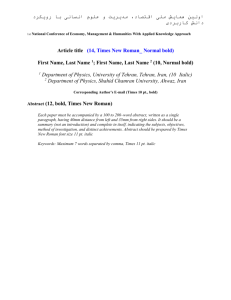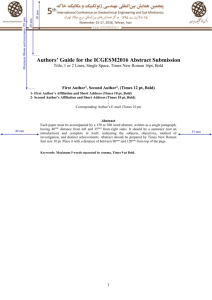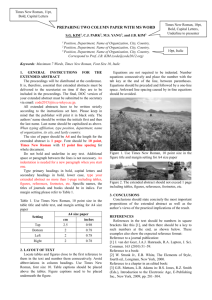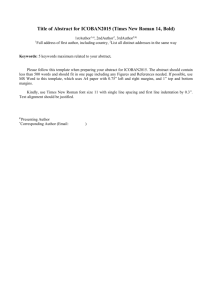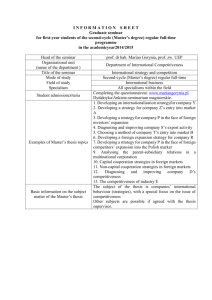Sample Thesis Format - Department of Banking and Finance
advertisement
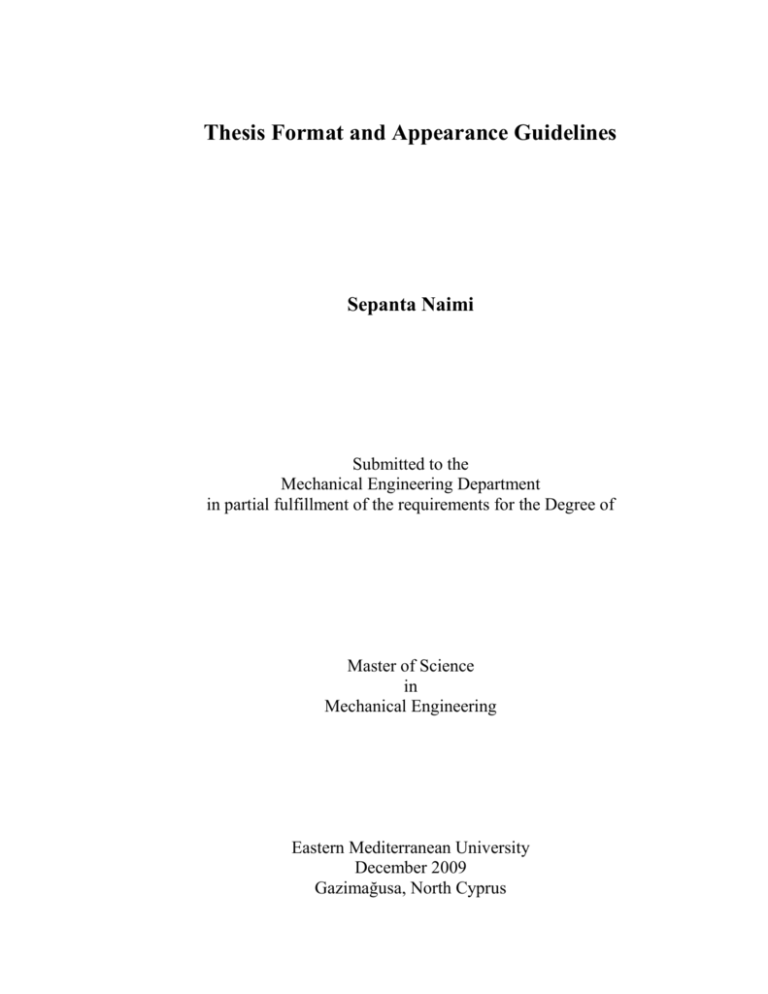
Thesis Format and Appearance Guidelines Sepanta Naimi Submitted to the Mechanical Engineering Department in partial fulfillment of the requirements for the Degree of Master of Science in Mechanical Engineering Eastern Mediterranean University December 2009 Gazimağusa, North Cyprus Approval of the Institute of Graduate Studies and Research Prof. Dr. Elvan Yılmaz Director (a) I certify that this thesis satisfies the requirements as a thesis for the degree of Master of Science in Mechanical Engineering. Assoc. Prof. Dr. Fuat Egelioğlu Chair, Department of Mechanical Engineering We certify that we have read this thesis and that in our opinion it is fully adequate in scope and quality as a thesis for the degree of Master of Science in Mechanical Engineering. Asst. Prof. Dr. Hasan Hacışevki Supervisor Examining Committee 1. Prof. Dr. Majid Hashemipour 2. Assoc. Prof. Dr. Fuat Egelioğlu 3. Asst. Prof. Dr. Hasan Hacışevki ABSTRACT Privatization is the process of transferring government properties (public utilities) from the public sector to the private sector. There should be rules and regulations, which privatizations have to follow to get those resources. There are both positive and negative externalities from the privatization of water systems. Provision of the basic water services is a government’s responsibility in many developing countries around the world. Whether government is unable to supply the water or it lacks the necessary authority over the natural sources of water, the government has to make arrangements for a reliable water provision. Format Paragraph Spacing After 24 pt This thesis deals with the privatization of water system and its impacts on the stakeholders. How does privatization affect the poor people? The secondary data used for this study is derived from three cases: Metro Manila Waterworks and Sewerage System, Philippines, Espirito Santo Water System, Brazil and Water and Sewerage Utility, Panama. A key priority in designing urban water policy and institutional reforms with the appropriate structure of water charges is to ensure long-term sustainability of supply. The recommendations which are developed in this thesis are that the governments have to be very precise in the specification of the terms and conditions of the privatization, if it is going to achieve its goals. Keywords: Stakeholder analysis, poor, economic analysis, financial analysis. iii ÖZ Devletin vermekle yükümlü olduğu hizmetleri özel sektöre devretmesine özelleştirme denir. Özelleştirmenin gerçekleşebilmesi için kurallar ve düzenlemeler vardır. Özelleştirmede birçok pozitif ve negatif diş etkenler vardır. Gelişmekte olan ülkelerde su dağıtım sistemi devletlerin sorumluluğu altındadır. Devletler yeterli ve verimli su dağıtımı yapamadıkları için özelleştirme yolunu seçmektedirler. Anahtar Kelimeler: Stakeholder Analizi, Ekonomik Analiz, Finansal Analiz iv DEDICATION (Optional) Title is not needed for dedication font size and type is free. To My Family v ACKNOWLEDGMENT (Optional) I would like to thank Asst. Prof. Dr. Hasan Hacışevki for his continuous support and guidance in the preparation of this study. Without his invaluable supervision, all my efforts could have been short-sighted. Assoc. Prof. Dr. Fuat Egelioğlu, Chairman of the Department of Mechanical Engineering, Eastern Mediterranean University, helped me with various issues during the thesis and I am grateful to him. I am also obliged to Prof. Dr. Majid Hashemipour for his help during my thesis. Besides, a number of friends had always been around to support me morally. I would like to thank them as well. I owe quit a lot to my family who allowed me to travel all the way from Iran to Cyprus and supported me all throughout my studies. I would like to dedicate this study to them as an indication of their significance in this study as well as in my life. vi PREFACE (if available) vii TABLE OF CONTENTS ABSTRACT ......................................................................................................................iii ÖZ ..................................................................................................................................... iv DEDICATION (Optional) ................................................................................................. v ACKNOWLEDGMENT (Optional) ................................................................................. vi PREFACE (if available) .................................................................................................. vii LIST OF TABLES (if available) ...................................................................................... ix LIST OF FIGURES (if available) ...................................................................................... x LIST OF ILLUSTRATIONS (if available) ...................................................................... xi LIST OF SYMBOLS/ABBREVIATIONS (if available) ................................................ xii 1 INTRODUCTION (Style 1)............................................................................................ 1 1.1 Dynamic Energy flow .............................................................................................. 1 1.1.1 Nonspecific Van Waals Forces ......................................................................... 1 2 INTRODUCTION (Style 2)............................................................................................ 3 2.1 Dynamic Energy flow .............................................................................................. 3 2.1.1 Nonspecific Van Waals Forces ......................................................................... 3 REFERENCES .................................................................................................................. 4 APPENDIX/APPENDICES (if available) ......................................................................... 5 Appendix A: Title of Appendix ..................................................................................... 6 INDEX (optional) .............................................................................................................. 7 viii LIST OF TABLES Table 1: General evaluation measurement of sustainable development recognition ......... 2 Also it can be including chapter number like Table 1.1 ix LIST OF FIGURES Figure 1: Sketch of Hamilton Avenue School ................. Error! Bookmark not defined. Also it can be including chapter number like Figure 1.1 x LIST OF ILLUSTRATIONS xi LIST OF SYMBOLS/ABBREVIATIONS (if available) xii Style 1, After each paragraph 24pt. or one empty space should be done Make chapter style, 16 pt, Times New Roman, Bold, Double space, Centered, After space 24pt Chapter 1 1 INTRODUCTION (Style 1) Header 1, 16 pt, Times New Roman, Bold, Double space, Centered, After space 48pt Header 2, 14 pt, Times New Roman, Bold, Double space, Left 1.1 Dynamic Energy flow Much theoretical and experimental effort has been devoted recently to study the dynamics of energy flow, following the initial excitation of a surface molecule. Format Paragraph Spacing After 24 pt Most of these studies deal with the processes of dissociative adsorption and desporption of small molecules chemisorbed on metal surfaces; these processes are governed by 4 cm formation and rupture of covalent adsorbate-metal chemical bonds. The processes of physical adsorption and desorption on non-metallic surfaces have received less attention. Header 3, 12 pt, Times New Roman, Bold, Double space, Left 1.1.1 Nonspecific Van Waals Forces The essential feature of the physisoprtion systems is that the attractive forces between the adsorbate and the surface are relatively nonspecific Van Waals forces. the interconnectedness of all living systems in a single living planetary system, the biosphere; the importance of natural cycles (of water, nutrients and other chemicals, materials, waste); and the passage of energy through trophic levels of living systems[1]. 1 2.5 cm Figure 1: Sketch of Hamilton Avenue School Table 1: General evaluation measurement of sustainable development recognition Consumption of renewable State of environment resources Sustainability More than nature's ability to replenish Environmental degradation Not sustainable Equal to nature's ability to replenish Environmental equilibrium Steady-state economy Environmental renewal Sustainable development Less than nature's ability to replenish 2 Style 2, At the start of each paragraph one indentation should be considered (about 0.5 cm or 0.2 inches) Click chapter style, 16 pt, Times New Roman, Bold, Double space, Centered, After space 24pt Chapter 2 2 INTRODUCTION (Style 2) Header 1, 16 pt, Times New Roman, Bold, Double space, Centered, After space 48pt Header 2, 14 pt, Times New Roman, Bold, Double space, Left 2.1 Dynamic Energy flow Much theoretical and experimental effort has been devoted recently to study the dynamics of energy flow, following the initial excitation of a surface molecule. Most of these studies deal with the processes of dissociative adsorption and desporption of small molecules chemisorbed on metal surfaces; these processes are governed by formation and rupture of covalent adsorbate-metal chemical bonds. The 4 cm processes of physical adsorption and desorption on non-metallic surfaces have received less attention. Header 3, 12 pt, Times New Roman, Bold, Double space, Left 2.1.1 Nonspecific Van Waals Forces The essential feature of the physisoprtion systems is that the attractive forces between the adsorbate and the surface are relatively nonspecific Van Waals forces. the interconnectedness of all living systems in a single living planetary system, the biosphere; the importance of natural cycles (of water, nutrients and other chemicals, materials, waste); and the passage of energy through trophic levels of living systems[1]. 3 2.5 cm REFERENCES Style 1: [1] Allen, F., Bartiloro, L., & Kowalewski, O. (2006). Does Economic Structure Determine Financial Structure? Working Paper. The Wharton School, University of Pennsylvania. [2] http://en.wikipedia.org/wiki/Sustainability#cite_note-57#cite_note-57 [3] Beck, T., & Levine, R.(2004). Stock Markets, Banks and Growth: Panel Evidence. Journal of Banking and Finance. 28, 423-442. Style 2: Allen, F., Bartiloro, L., & Kowalewski, O. (2006). Does Economic Structure Determine Financial Structure? Working Paper. The Wharton School, University of Pennsylvania. Beck, T., & Levine, R.(2004). Stock Markets, Banks and Growth: Panel Evidence. Journal of Banking and Finance. 28, 423-442. CABE/BCO. (2005, April 30). The impact of office design on business performance. London: Commission for Architecture & the Built Environment and the British 4 APPENDIX/APPENDICES 5 Appendix A: Title of Appendix 6 INDEX 7

